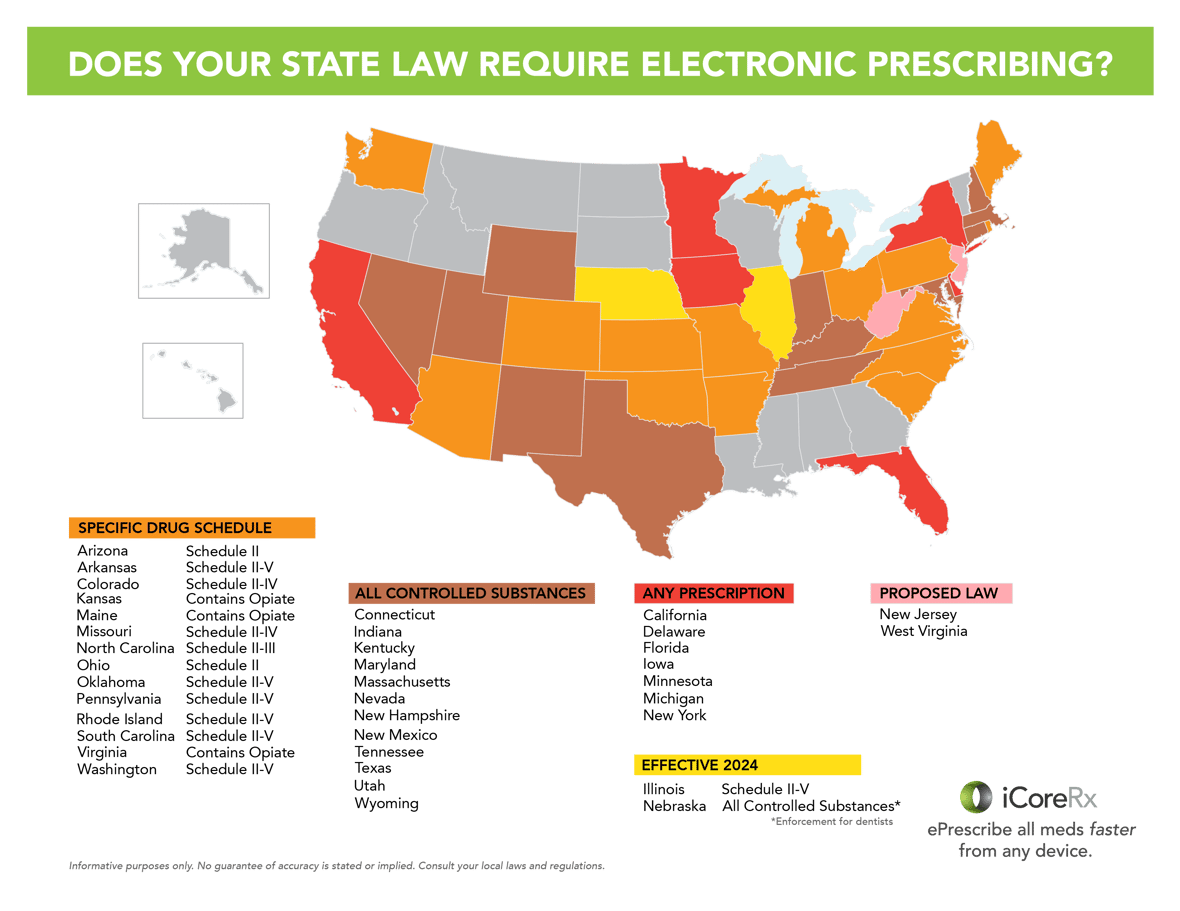| Alabama |
Alabama does not currently mandate ePrescribing. However, it does require the use of the state’s PDMP program. |
| Alaska |
Alaska does not currently mandate ePrescribing. However, it does require the use of the state’s PDMP program. |
| Arizona |
As of July 9, 2021, Arizona requires that all Schedule II drugs be prescribed electronically and, before prescribing an opioid analgesic or benzodiazepine controlled substance listed in Schedule II, III, or IV, prescribers must check the CSPMP. |
| Arkansas |
As of January 1, 2022, prescribers must electronically prescribe any Schedule II-VI controlled substance and submit that information to the Arkansas prescription drug monitoring program (PDMP) |
|
California
|
As of January 1, 2022, all prescriptions issued by a licensed healthcare practitioner to a California pharmacy must be submitted electronically. Prescribers are also required to use the state's PDMP prior to prescribing all opioids. |
| Colorado |
As of July 1, 2023, Colorado requires that all medical practitioners, including dentists, prescribe all Schedule II-IV controlled substances electronically. |
| Connecticut |
As of January 1, 2018, Connecticut requires that any prescription for controlled substances be prescribed electronically and to check the Connecticut CPMRS prior to prescribing any controlled substance. |
| Delaware |
As of January 1, 2021, Delaware requires that all prescriptions be electronically prescribed. Further, prescribers must report all schedule II, III, IV, and V controlled substances to Delaware’s PMP database. |
|
Florida
|
As of July 1, 2021 Florida requires that all prescriptions be electronically prescribed. Further, dispensers must report all schedule II, III, IV, and V controlled substances to Florida’s E-FORCSE® prescription drug database. |
| Georgia |
Georgia does not currently mandate ePrescribing. However, it does require the use of the state’s PDMP program. |
| Hawaii |
Hawaii does not currently mandate ePrescribing. However, it does require the use of the state’s PDMP program. |
| Idaho |
Idaho does not currently mandate ePrescribing. However, it does require the use of the state’s PDMP program. |
| Illinois |
As of January 1, 2024, Illinois requires that all schedule II-V controlled substances be prescribed electronically. Further, prescribers are required to check the Illinois PMP when prescribing Schedule 2 narcotics. |
| Indiana |
As of December 31, 2021, Indiana requires that all prescriptions be electronically prescribed. Further, prescribers are required to submit data regarding controlled substances to the Indiana PMP. |
| Iowa |
As of January 1, 2020 Iowa requires that all prescriptions be electronically prescribed. Further, dispensers are required to report all Schedule II, III, IV and V controlled substances and opioid antagonists as well as all OTC (non-prescription) Schedule V (e.g., codeine containing cough syrups) to Iowa’s PMP. |
| Kansas |
As of July 1, 2021, Kansas requires that all prescriptions for controlled substances that contain an opioid be electronically prescribed. There is currently no mandate for use of the PDMP. |
| Kentucky |
As of January 1, 2021, Kentucky requires that all prescriptions for controlled substances be electronically prescribed. Further, prescribers are required to submit data regarding controlled substances to the Kentucky PDMP. |
| Louisiana |
Louisiana does not currently mandate ePrescribing. However, it does require the use of the state’s PDMP program. |
| Maine |
As of July 1, 2017, Maine prescribers are required to electronically transmit prescriptions for Schedule II-IV controlled substances that contain opioids. Prescribers are also required to check the Maine Prescription Drug Monitoring Program (PMP) prior to writing specific prescriptions for controlled substances. |
| Maryland |
As of January 1, 2023, Maryland prescribers are required to electronically transmit prescriptions for controlled dangerous substances. Prescribers are also required to check the Maryland Prescription Drug Monitoring Program (PDMP) prior to writing specific prescriptions for controlled substances. |
| Massachusetts |
As of January 1, 2021, Massachusetts requires that all controlled substances must be prescribed electronically. Further, prescribers are also required to complete prescription history checks through the Massachusetts Prescription Awareness Tool (MassPAT). |
| Michigan |
As of January 1, 2023, Michigan requires all prescriptions be transmitted electronically. Further, prescribers are also required to complete prescription history checks through the Michigan Automated Prescription System (MAPS) before dispensing or prescribing opioids, benzodiazepines, barbiturates, or carisoprodol. |
| Minnesota |
As of January 1, 2011, Minnesota requires all prescriptions be electronically. Further, prescribers are required to submit data regarding controlled substances to the Minnesota PDMP. |
| Mississippi |
Mississippi does not currently mandate ePrescribing. However, it does require the use of the state’s PDMP program. |
| Missouri |
As of January 1, 2021, Missouri requires electronic prescriptions for Schedule II-IV controlled substances.
Missouri is on track for a statewide PDMP, though no go-live date has been set. |








